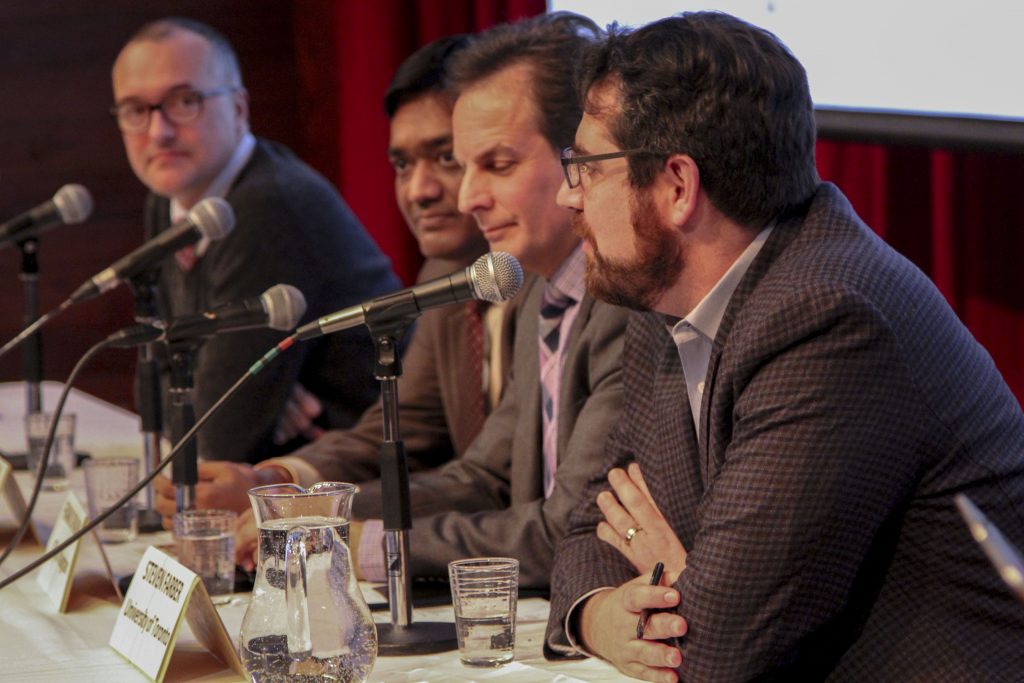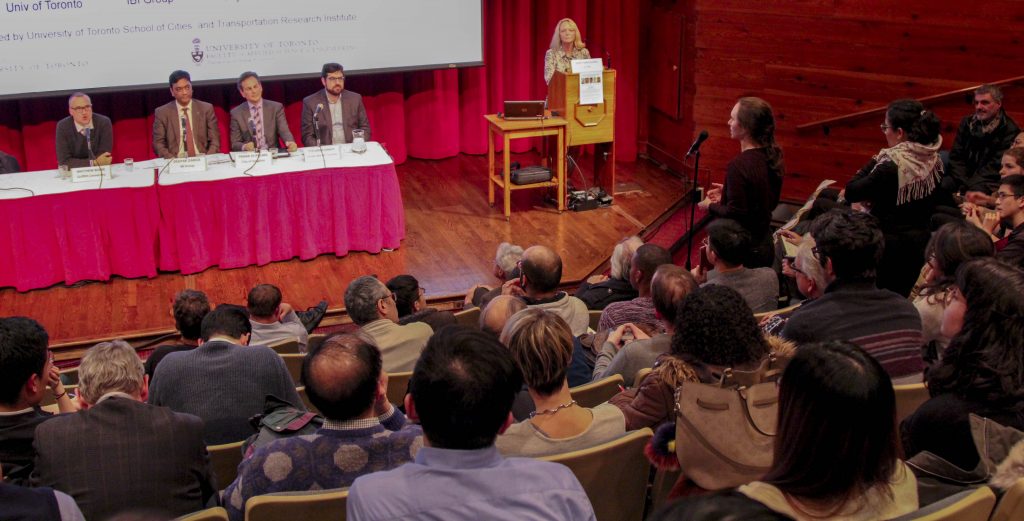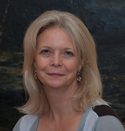
Why Smart Cities are maybe so 2017 (and what this means for urban transport innovation and our social relations), a free public presentation and moderated panel discussion, took place on January 8, 2019 at George Ignatieff Theatre.
Eric Miller gave a welcome and opening statements on behalf of event co-sponsors UTTRI and School of Cities. Judy Farvolden then introduced keynote guest speaker, Professor Matthew Burke of Griffith University, Australia.
Professor Matthew Burke presented a compelling, dynamic talk accompanied by slides and great use of the theatre’s wide stage area.
Panelists Deepak Darda, Frank Di Palma and Steven Farber gave short presentations, following which the floor was opened to questions from the audience.

The event concluded with a high level summary of the event from Judy Farvolden.
The large turnout for this event points to a keen appetite for learning more about Smart Cities – what’s here now, and what’s in store for tomorrow for cities in Canada and worldwide.
Abstract
There has been significant policy interest in Smart Cities as a means of harnessing the power of new IT solutions, urban sensors and Big Data to provide services more efficiently. But Smart Cities are part of a broader set of initiatives with a long history in urban technology and planning to try and generate innovation. Whilst data-driven service delivery initiatives are succeeding on their own, so-called living laboratories, knowledge precincts and other techno-utopian dreams that try to create a holistic Smart City have usually fallen short of expectations. Songdo in South Korea and Masdar in Abu Dhabi have struggled to achieve their goals. Now it is Google’s SidewalkLabs Quayside development in Toronto that is gaining international attention.
This partnership will be trialing tech solutions to urban problems, including shared mobility, and developing new tools for urban management. This presentation explores the underpinnings of the Smart Cities movement, describes what is happening with key Smart City initiatives, and provides critiques of Smart City philosophy from key urban theorists. All this is used to explore what it means for innovation in urban mobility and for social relations in the city.
Short biography of speaker
Matthew Burke is Associate Professor, Transport Academic Partnership Chair and Principal Research Fellow, Cities Research Institute, Griffith University, Brisbane, Australia.
His research is mainly in travel behaviour, transport policy and planning, and the interactions of transport and land use. He leads the transport research team within the Cities Research Institute and is currently engaged in a series of projects on transport innovations with the Queensland Government. His research team has lifted Griffith University into the top 100 universities in the world in the field of transportation science and technology in the latest Shanghai rankings.
Panelists
Deepak Darda, Global Director, Innovation, IBI Group, is an alum of the Harvard Business School with Masters degree from Massachussetts Institute of Technology (MIT) and Bachelors degree from IIT Bombay. As the head of the Office of Innovation at IBI Group, Deepak is driving the IBI Group’s global strategic initiative of becoming a technology driven design firm (Tech Pivot) through focussed efforts on catalyzing core growth, transforming IBI Group’s business models, investigating future disruptions and enhancing innovation. Deepak is also IBI Group’s lead for the Smart City Sandbox, which is an unique partnership initiative between industry leaders to tap the start-up eco system for bringing innovative solutions in Urban environments.
Prior to becoming the Global Director for innovation, Deepak built the India office of IBI Group from the ground up into the highly reputed firm that it is today. Deepak is passionate about new challenges and old friends!
Frank Di Palma, Chief Information Officer at City of Vaughan, is responsible for the system-wide information technology systems and services. He provides collaborative executive leadership to advance the overall vision, goals, strategies and plans for the effective and appropriate use of information technologies to further develop the City of Vaughan’s system. Frank’s role includes working with industry partners to introduce technology that is more operational and cost-effective for Vaughan taxpayers – all in support of community priorities. He is leading the implementation of Vaughan’s Digital Strategy which was developed to effectively begin the City’s essential journey towards a digital transformation. Frank is a key member of the Vaughan Smart City Advisory Task Force to transform Vaughan into a leading Smart City. Serving the City of Vaughan since 1998, Frank is a proud Vaughan citizen who actively represents the City at municipal, provincial and national levels.
Steve Farber, Assistant Professor, Department of Human Geography, UTSC, is a quantitative transportation geographer and spatial analyst. His research program investigates how land use and transportation systems affect social and economic outcomes of urban areas. At the core of his research philosophy is the belief that travel behaviour is a means through which land use and transportation systems are linked to social, economic and environmental conditions. Farber’s work is aimed at better understanding this link in an effort to improve the sustainability of transportation and land use planning. This is achieved through the development of novel geo-computational and spatial econometric techniques and their judicious application to a number of research areas including: activity behaviour accessibility, and social sustainability. Farber’s interdisciplinary approach draws from and contributes to the theories of activity and travel behaviour modelling, urban-, transportation-, and time-geography, spatial analysis, and geographic information science (GIS).
Moderator
Dr. Judy Farvolden is the Executive Director of the University of Toronto Transportation Research Institute (UTTRI). This appointment brings her back full circle to transportation research after two decades in financial risk management and banking technology. In that time she held senior management roles in professional services, research management, communications, business development and software development. Graduate studies in both urban planning and transportation and operations research have prepared her to collaborate effectively with large, multidisciplinary teams.
Dr. Farvolden is responsible for developing and maintaining government and industrial partnerships to support UTTRI operations on an on-going, sustainable basis. She develops collaborations among UTTRI faculty, and with government and industry partners, to address challenges and opportunities they address on behalf of our communities. Dr. Farvolden is a member of the Toronto Region Board of Trade’s Smart Cities Working Group and serves on the boards of the Canadian Urban Institute and WTS Toronto Area Chapter.
This event was presented jointly with the University of Toronto School of Cities.








